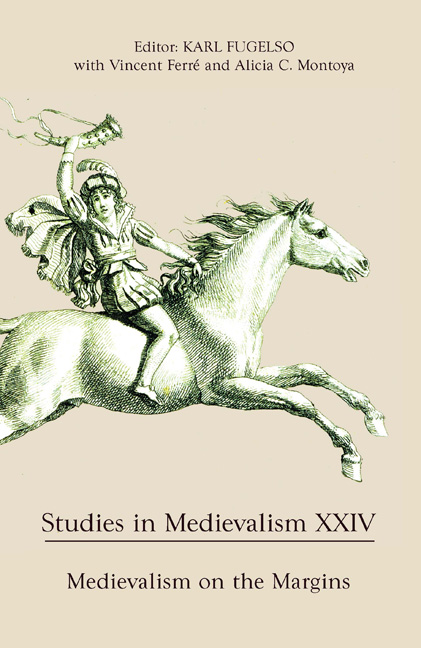Book contents
- Frontmatter
- Acknowledgments
- Contents
- List of Illustrations
- Volume XXIV 2015
- Editorial Note
- I Medievalism on the Margins: Some Perspective(s)
- II Trans-Atlantic Medievalism(s)
- 9 Speaking of the Middle Ages Today: European and Transatlantic Perspectives
- 10 Echoes from the Middle Ages: Tales of Chivalry, Romances, and Nation-building in Spain (1750–1850)
- 11 Antiquarianism over Presentism: Reflections on Spanish Medieval Studies
- 12 Medievalism and the Contemporaneity of the Medieval in Postcolonial Brazil
- III Other Interpretations
- Contributors
10 - Echoes from the Middle Ages: Tales of Chivalry, Romances, and Nation-building in Spain (1750–1850)
from II - Trans-Atlantic Medievalism(s)
Published online by Cambridge University Press: 05 December 2015
- Frontmatter
- Acknowledgments
- Contents
- List of Illustrations
- Volume XXIV 2015
- Editorial Note
- I Medievalism on the Margins: Some Perspective(s)
- II Trans-Atlantic Medievalism(s)
- 9 Speaking of the Middle Ages Today: European and Transatlantic Perspectives
- 10 Echoes from the Middle Ages: Tales of Chivalry, Romances, and Nation-building in Spain (1750–1850)
- 11 Antiquarianism over Presentism: Reflections on Spanish Medieval Studies
- 12 Medievalism and the Contemporaneity of the Medieval in Postcolonial Brazil
- III Other Interpretations
- Contributors
Summary
When the printer Antón de Centenera published Gómez Manrique's Regimiento de príncipes in 1482, he could hardly have imagined that he was creating a new publishing line whose fortune in Spain would extend over four centuries. Since it was only a short work, Centenera used a single sheet for it, producing the first known pliego suelto in Spain: cordel literature was thus inaugurated. In the first few years, pliegos sueltos were used only to distribute short works of poetry among the court elite, but in the early sixteenth century astute printers realized the great profits that they could make by mass-producing small works at a price that almost anyone who wanted them could afford. As a publishing genre, cordel literature is one of the fundamental forms of popular literature in Spain between the sixteenth and nineteenth centuries, and it has characteristics in common with material published in other European countries, such as England (broadside ballads, chapbooks), France (bibliothèque bleue, canards), and Italy (libri da risma, stampe popolari). It was used to accommodate a heterogeneous mixture of contents (pictures and texts, in prose or verse, on an enormous range of subjects), the only requisite for which, for their publishers, was that they should be certain to arouse great demand.
From the outset, these pliegos sueltos naturally included works of medieval origin, especially romances (ballads) from the oral tradition. Most of the medieval texts disappeared from cordel literature with the passing of the years, as a result of the emergence of new titles for which there was more demand. Some survived, however, and continued to be printed century after century. The present study concentrates on part of this very extensive printed material, historias caballerescas breves (short tales of chivalry), and on a specific period, between 1750 and 1850. The reasons for this are, first, the fact that these prose texts are less well known, especially in comparison with the extensively studied Spanish ballads, and second, these tales of chivalry suffered attacks from censors in the eighteenth century, which enables me to link their decline to the contrasting rise of medieval romances at the end of that century and especially in the nineteenth century, as the romances were popularized by erudite elites that saw in them the essence of the true Spanish nation.
- Type
- Chapter
- Information
- Studies in Medievalism XXIVMedievalism on the Margins, pp. 93 - 114Publisher: Boydell & BrewerPrint publication year: 2015



